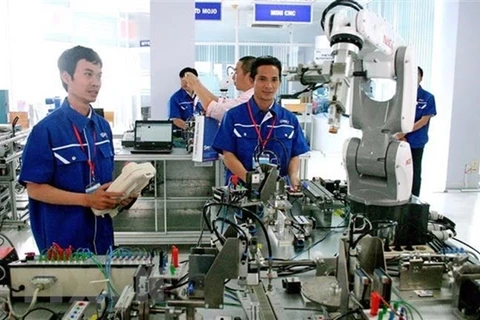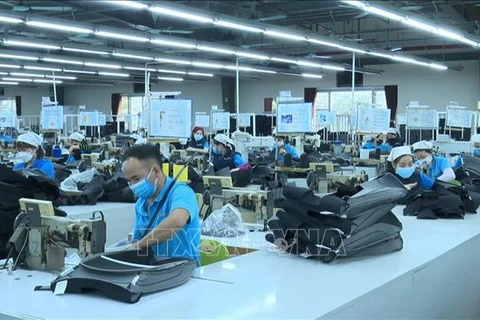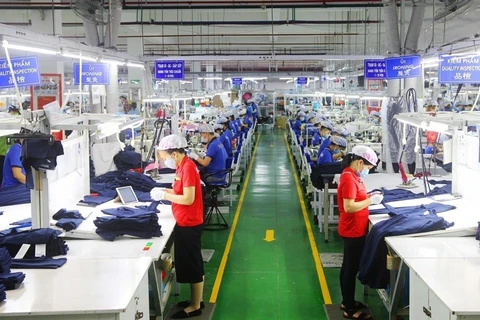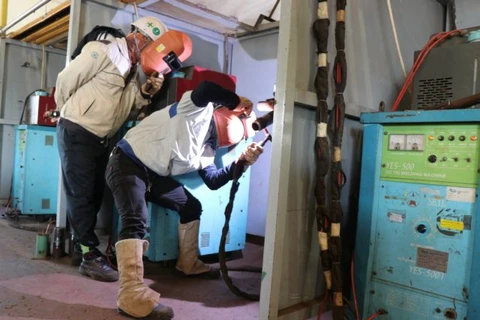Hanoi (VNS/VNA) - The youngest echelons of the Vietnamese workforce must be quickly equipped with the soft and digital skills needed to adapt to the requirements of the 4.0 revolution, a senior official of the Vietnam Chamber of Commerce and Industry (VCCI) has said.
VCCI Secretary General Tran Thi Lan Anh said to increase labour productivity in the coming period, "it must rely mainly on innovation and application of scientific advances."
She was speaking at the event "Dialogue on Business Engagement on Skills Development for Employability of Young People" in Hanoi on September 27.
She added: "If enterprises want to innovate, they must pay attention to developing human resources, including the professional skills development of workers, especially young workers."
At the event, co-organised by VCCI and UNICEF Vietnam, Lesley Miller, Deputy Representative to UNICEF Vietnam, said that enterprises and business communities played a critical role in building and improving employability skills for young people.
"In a global economy increasingly focused on high productivity and a skilled labour force, reliance on labour-intensive industries will no longer be a comparative edge," said Lesley Miller.
Nguyen Thi Thuan, former Rector of the University of Labour and Social Affairs, said: "Today, besides job skills, businesses need workers with soft skills such as communication, teamwork, and problem-solving."
According to her research, 83% of university graduates are assessed as lacking soft skills, and 37% of graduates cannot find suitable jobs due to weak skills. As such, 40% of new employees must be retrained.
VCCI reported that labour productivity in Vietnam has improved in the past many years in the ASEAN region, reaching an average of 4.77% per year, proving that the skill level of workers has been gradually raised.
However, according to Tran Thi Lan Anh, the COVID-19 pandemic and the industrial revolution 4.0 were a "double shock" to the global labour market.
"They caused increasing unemployment and social inequality, especially for the young workforce."
According to the General Statistics Office's report on the labour and employment situation in the fourth quarter of 2021, Vietnam has a "golden labour" structure. This means the population that can work (15 to 64 years old) accounts for a high proportion, currently about 69% of the population.
Lan Anh said: "This is an opportunity for us to take advantage, creating a strong driving force for fast and sustainable development."/.
VCCI Secretary General Tran Thi Lan Anh said to increase labour productivity in the coming period, "it must rely mainly on innovation and application of scientific advances."
She was speaking at the event "Dialogue on Business Engagement on Skills Development for Employability of Young People" in Hanoi on September 27.
She added: "If enterprises want to innovate, they must pay attention to developing human resources, including the professional skills development of workers, especially young workers."
At the event, co-organised by VCCI and UNICEF Vietnam, Lesley Miller, Deputy Representative to UNICEF Vietnam, said that enterprises and business communities played a critical role in building and improving employability skills for young people.
"In a global economy increasingly focused on high productivity and a skilled labour force, reliance on labour-intensive industries will no longer be a comparative edge," said Lesley Miller.
Nguyen Thi Thuan, former Rector of the University of Labour and Social Affairs, said: "Today, besides job skills, businesses need workers with soft skills such as communication, teamwork, and problem-solving."
According to her research, 83% of university graduates are assessed as lacking soft skills, and 37% of graduates cannot find suitable jobs due to weak skills. As such, 40% of new employees must be retrained.
VCCI reported that labour productivity in Vietnam has improved in the past many years in the ASEAN region, reaching an average of 4.77% per year, proving that the skill level of workers has been gradually raised.
However, according to Tran Thi Lan Anh, the COVID-19 pandemic and the industrial revolution 4.0 were a "double shock" to the global labour market.
"They caused increasing unemployment and social inequality, especially for the young workforce."
According to the General Statistics Office's report on the labour and employment situation in the fourth quarter of 2021, Vietnam has a "golden labour" structure. This means the population that can work (15 to 64 years old) accounts for a high proportion, currently about 69% of the population.
Lan Anh said: "This is an opportunity for us to take advantage, creating a strong driving force for fast and sustainable development."/.
VNA
























